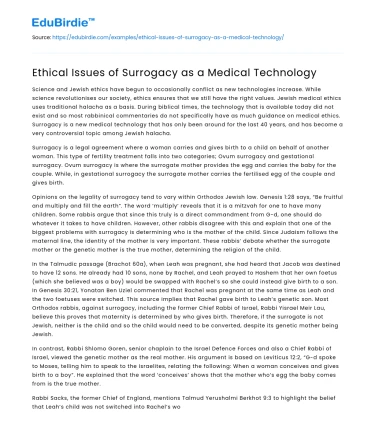Science and Jewish ethics have begun to occasionally conflict as new technologies increase. While science revolutionises our society, ethics ensures that we still have the right values. Jewish medical ethics uses traditional halacha as a basis. During biblical times, the technology that is available today did not exist and so most rabbinical commentaries do not specifically have as much guidance on medical ethics. Surrogacy is a new medical technology that has only been around for the last 40 years, and has become a very controversial topic among Jewish halacha.
Surrogacy is a legal agreement where a woman carries and gives birth to a child on behalf of another woman. This type of fertility treatment falls into two categories; Ovum surrogacy and gestational surrogacy. Ovum surrogacy is where the surrogate mother provides the egg and carries the baby for the couple. While, in gestational surrogacy the surrogate mother carries the fertilised egg of the couple and gives birth.
Save your time!
We can take care of your essay
- Proper editing and formatting
- Free revision, title page, and bibliography
- Flexible prices and money-back guarantee
Opinions on the legality of surrogacy tend to vary within Orthodox Jewish law. Genesis 1:28 says, “Be fruitful and multiply and fill the earth”. The word ‘multiply’ reveals that it is a mitzvah for one to have many children. Some rabbis argue that since this truly is a direct commandment from G-d, one should do whatever it takes to have children. However, other rabbis disagree with this and explain that one of the biggest problems with surrogacy is determining who is the mother of the child. Since Judaism follows the maternal line, the identity of the mother is very important. These rabbis’ debate whether the surrogate mother or the genetic mother is the true mother, determining the religion of the child.
In the Talmudic passage (Brachot 60a), when Leah was pregnant, she had heard that Jacob was destined to have 12 sons. He already had 10 sons, none by Rachel, and Leah prayed to Hashem that her own foetus (which she believed was a boy) would be swapped with Rachel’s so she could instead give birth to a son. In Genesis 30:21, Yonatan Ben Uziel commented that Rachel was pregnant at the same time as Leah and the two foetuses were switched. This source implies that Rachel gave birth to Leah’s genetic son. Most Orthodox rabbis, against surrogacy, including the former Chief Rabbi of Israel, Rabbi Yisrael Meir Lau, believe this proves that maternity is determined by who gives birth. Therefore, if the surrogate is not Jewish, neither is the child and so the child would need to be converted, despite its genetic mother being Jewish.
In contrast, Rabbi Shlomo Goren, senior chaplain to the Israel Defence Forces and also a Chief Rabbi of Israel, viewed the genetic mother as the real mother. His argument is based on Leviticus 12:2, “G-d spoke to Moses, telling him to speak to the Israelites, relating the following: When a woman conceives and gives birth to a boy”. He explained that the word ‘conceives’ shows that the mother who’s egg the baby comes from is the true mother.
Rabbi Sacks, the former Chief of England, mentions Talmud Yerushalmi Berkhot 9:3 to highlight the belief that Leah’s child was not switched into Rachel’s womb but the foetus was rather changed from boy to girl by a miracle. Therefore, this belief indicates that Rachel’s son was her genetic son (Joseph). The advances in science, specifically reproductive technologies, are compelling Jewish law to progress as it increasingly effects more Jewish families across the globe.






 Stuck on your essay?
Stuck on your essay?

